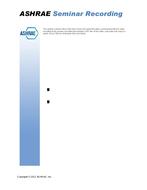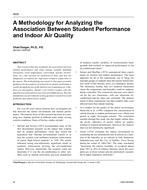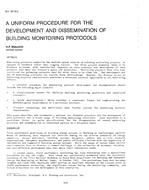Energy-conserving design must incorporate considerations of thermal comfort. An energy-conserving building that sacrifices thermal comfort for energy performance may adversely affect the well-being of its occupants and decrease productivity. Evaluates the impact of parametric variations in envelope design and HVAC operation on the energy performance and thermal comfort of a typical commercial office building in Singapore. Energy consumption was evaluated via a parametric simulation using the program DOE2.1B. Fanger’s equation of comfort was applied to the resulting environment associated with each parametric design to evaluate its degree of thermal comfort. Energy-conserving measures applied to the reference building (square plan, with shallow exterior wall to core depth) resulted in a less than 1% drift in predicted percentage dissatisfied, indicating that energy conservation is achievable without loss of occupant comfort.
KEYWORDS: buildings, energy conservation, thermal comfort, Singapore, offices, occupiers, designing, building services, energy consumption, calculating, computer programs.
Citation: ASHRAE Transactions 1993, Vol.99, pt.1
Product Details
- Published:
- 1993
- Number of Pages:
- 14
- File Size:
- 1 file , 1.2 MB
- Product Code(s):
- D-17659


